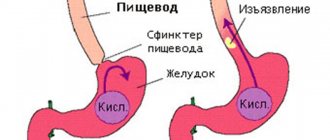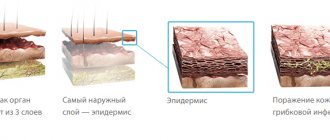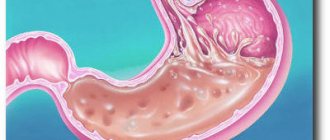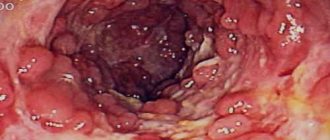Gastritis
– this is an inflammation of the gastric mucosa; in cases where the inflammatory process affects the duodenal mucosa, the disease is called gastroduodenitis.
Inflammation can be caused by various reasons and occur in different ways. Therefore, there are a number of types of gastritis. In other words, gastritis is a designation for a whole group of diseases associated with disruption of the gastric mucosa.
The prevalence of gastritis is very high. At least every second person suffers from gastritis. Poor nutrition, so common for metropolitan residents, further increases the likelihood of developing the disease.
Inflammation of the mucous membrane disrupts the functioning of the stomach, which means it affects the flow into the body of substances necessary for its functioning. Therefore, gastritis can cause disruption in the functioning of almost all organs and systems and significantly worsen a person’s quality of life.
What is gastritis like?
The most common form of chronic gastritis (CG) is bacterial, it occurs in almost 70% of patients. Most often it is provoked by the bacterium Helicobacter pylori (Fig. 1). Resistant to stomach acid, it is spread by the oral-fecal route. The enzymes secreted by H. pilory contribute to the destruction of the protective mucus of the stomach, which protects the tissues from the aggressive effects of gastric juice. Helicobacter is represented by various strains - from relatively harmless to extremely dangerous, causing the formation of chronic ulcers and even stomach cancer.
Figure 1. Helicobacter pylori bacterium, which causes gastritis. Micrograph using SEM. Photo: Yutaka Tsutsumi
Harm and benefits of Helicobacter
Important! H. pylori does not always lead to gastritis and can be beneficial for our body. In recent years, the positive effect of these bacteria on the functioning of the immune system has been proven. H. pylori is able to interact with T lymphocytes, suppressing inflammation, and reducing the risk of developing allergies and asthma.
Other types of gastritis include:
- Autoimmune (15% of cases). Caused by aggression of the body's own antibodies, attacking the cells responsible for the secretion of acid in the stomach. This form of gastritis is characterized by increased pH levels and constant release of the hormone gastrin, which leads to the formation of microtumors in the stomach,
- Chemical (10% of cases). Caused by the action of various drugs (acetylsalicylic acid, non-steroidal anti-inflammatory drugs, antibacterial and other drugs) that irritate the gastric mucosa or reduce its protective properties,
- Reflux gastritis (5% of cases). They develop if bile enters the stomach. The cause of reflux gastritis can be inflammation of the duodenum or surgery to remove part of the stomach,
- Special forms (less than 1%). These include Crohn's disease, radiation, eosinophilic and other types of gastritis.
Important! The development of hCG is facilitated by the absence of teeth, foci of chronic infection in the oral cavity and pharynx (caries, inflamed tonsils), smoking, excessive alcohol consumption, stress, serious injury or surgery.
There are many classifications of gastritis: by localization (gastritis of the body of the stomach, antrum of the stomach, fundus of the stomach, pangastritis), by the degree of tissue damage (superficial, gastritis with damage to the glands without atrophy, atrophic, hypertrophic gastritis).
Why is gastritis dangerous?
Left unattended, gastritis can develop more and more severe consequences. Over time, the superficial inflammatory process can cause deep tissue damage - erosions and ulcers, which can lead to life-threatening gastric bleeding. Certain strains of Helicobacter significantly increase the risk of developing stomach cancer. The same complications occur in patients with chemical gastritis. Autoimmune gastritis is more characterized by mucosal atrophy and pernicious anemia with vitamin B12 deficiency.
Symptoms
For many people, gastritis occurs with virtually no symptoms.
Obvious signs of the disease usually appear in the acute phase (Table 1). In this case, the leading symptom of gastritis is pain in the upper third of the abdomen (in the pit of the stomach): dull, burning, aching, gnawing, sucking, sharp. Table 1. Symptoms of chronic gastritis in the acute phase and in the remission phase.
| Chronic gastritis without exacerbation phase | Chronic gastritis in the acute phase |
| Mild pain in the epigastric (epigastric) region | Pain in the epigastric (epigastric) region of varying intensity |
| Feeling of fullness, distension and heaviness in the stomach after eating | Feeling of fullness in the stomach |
| Attacks of nausea | Nausea |
| Belching of air or food eaten | Belching |
| Heartburn | Unpleasant taste in the mouth |
| Unstable stool (alternating constipation and diarrhea) | Drooling after eating |
| Bloating | Vomiting, which provides temporary relief |
| General weakness, headache, temperature may rise to 37.5 degrees | |
| Symptoms are clearly expressed 2-3 hours after eating |
Important! If you find at least some signs of hCG, consult a doctor. Before the examination, it is not recommended to use heating pads, enemas, or take medications.
Preventing exacerbations
To prevent exacerbation of chronic gastritis, you should follow the rules of therapeutic nutrition. Food should be consumed fractionally, in small portions, without overloading the stomach. For preventive purposes, it is recommended to stop drinking alcohol and smoking. During the period of remission with increased or normal acidity, you should take courses of mineral waters that have a depressing effect on gastric secretion: “Luzhanskaya”, “Slavyanskaya”, “Borjomi”, “Moskovskaya”.
Periodically, as prescribed, you should take the drugs “Gastrofarm”, “Vikalin”, “De-nol”.
Diagnostics
Gastritis is much easier to treat if it can be diagnosed in the early stages of the disease.
Who to contact
Gastroenterologists, doctors specializing in diseases of the digestive system, are responsible for the diagnosis and treatment of chronic gastritis. Gastritis often becomes an accidental finding during a routine examination or search for other diseases. Gastroenterology is a broad branch of medicine that requires the doctor not only highly specialized training, but also interdisciplinary knowledge and good erudition.
What tests should I take?
The classic method for diagnosing gastritis is gastroscopy (esophagogastroduodenoscopy, endoscopy), which is combined with a biopsy if a malignant process is suspected. During the procedure, a special device is inserted into the patient’s stomach through the mouth - a gastroscope, consisting of a long tube with a built-in camera. It allows the endoscopist to examine in detail the condition of the mucous membrane of the esophagus, stomach and duodenum (Fig. 2).
Figure 2. Performing gastroscopy. Photo: CC0 Public Domain
Since most cases of CG are associated with the presence of the bacterium Helicobacter pylori in the body, when gastritis is detected, a urease breath test is often performed (for the enzyme urease secreted by Helicobacter), as well as a blood test for antibodies to this bacterium or a stool test for the presence of its antigens in it.
Computed tomography and magnetic resonance imaging help answer the question: is it really gastritis and does the patient have stomach cancer (Fig. 3).
Figure 3. Gastritis detected on tomography. Photo: Eigenes Werk
Treatment
Treatment is always selected individually depending on the type of gastritis and its cause. Timely treatment can reduce symptoms, if present, and reduce the likelihood of complications.
Medicines
Drug treatment of chronic gastritis can be symptomatic or etiological - aimed at eliminating one or another cause of the disease. If H. pylori is detected in a patient with gastritis, eradication therapy is used to destroy it. In particular, the “French method” is popular today, which involves a combination of three drugs - two antibiotics plus a proton pump inhibitor. Unfortunately, it is impossible to eliminate the infection forever; after some time, the harmful microorganism again enters the body from carriers, in particular, from the patient’s relatives. Helicobacter very quickly becomes resistant to drugs, so the same antibiotics cannot be prescribed all the time.
With chemical gastritis, it is enough to eliminate its cause. For example, stopping taking medications whose side effects caused the disease. If it is not possible to refuse such a medicine, measures are taken to protect the stomach with the help of coating agents and drugs that regulate the acidity of gastric juice. The use of antacid (anti-acid) drugs helps restore damaged mucosa. It must be remembered that with the disappearance of the acid, its powerful antibacterial function disappears.
The selection of therapy for autoimmune chronic gastritis depends on the severity of inflammation. Basically, the use of medications is aimed at reducing the acidity of gastric juice. These are proton pump inhibitors, antacids and antihistamines.
Nutrition
Chronic gastritis cannot be overcome with medications alone. Radical changes are required in the patient's lifestyle, diet and diet. Therefore, already at the first appointment, the gastroenterologist necessarily recommends a certain type of diet depending on the acidity of the gastric juice: if it is low, you need acidic (berries, fruits) and juice products, if it is high, you need those that reduce the production of hydrochloric acid.
Among the products that are incompatible with the treatment of gastritis and are strictly contraindicated:
- Spices and seasonings, especially hot ones,
- Fat meat,
- Any fried food
- Smoked and canned products,
- Concentrated fruit and berry juices, especially those high in acids and sugars,
- Carbonated drinks.
Important ! It is recommended to limit the consumption of confectionery products (never on an empty stomach!), rye bread, fresh wheat pastries, strong tea and coffee.
There are quite a few approved foods for gastritis. By consuming them, you can easily create a varied and complete diet. Patients with gastritis are shown:
- Dairy products,
- Stale yeast bread,
- Lean meat, fish, soft and semi-hard cheeses,
- Soft-boiled eggs and omelet,
- Boiled cereals,
- Puree soups,
- Boiled and baked vegetables, fruits.
Diet for patients with chronic gastritis
The diet for chronic gastritis is aimed at developing favorable microflora in the gastrointestinal tract that regulates digestion and has a protective function. Meals should be fractional: regular meals 5-6 times a day. You should choose dishes that are boiled or steamed. Preferably boiled or baked meat, fermented milk products, high-fiber cereals, boiled or baked vegetables (Table 2).
The main amount of food should be consumed in the first half of the day.
It is necessary to avoid “snacks” of high-calorie foods and eating sweets on an empty stomach. Table 2. Dietary recommendations for patients with chronic gastritis.
| Gastritis with low acidity | Gastritis with high acidity |
| Healthy | |
| lean meat, fish, poultry; boiled, chopped, baked or lightly fried without breading in breadcrumbs or flour | whole milk (reduces the production of gastric juice) after meals. If the patient does not tolerate it well, you can add milk to tea |
| soups: meat, fish, mushroom, vegetable, cereal | cream, low-sour cottage cheese |
| whole milk only in dishes and drinks (porridge, cocoa), fermented milk products, cottage cheese, soft-boiled eggs, omelet | boiled, stewed, baked vegetables |
| well-cooked porridge, boiled pasta | all porridges, except millet, pasta |
| toasted white bread | lean meat, lean fish and poultry |
| non-acidic varieties of apples, pears, bananas | |
| white bread, preferably not too soft | |
| Provokes exacerbation | |
| spicy, salty, fried foods | juice products |
| canned meat and fish | strong and fatty broths - meat, fish and especially mushroom |
| soft bread and other fresh products made from yeast dough, baked goods | raw vegetables, pickles, marinades, spicy vegetable snacks, smoked meats |
| pastry, pies, brown bread | |
| ice cream, cold drinks | |
| sour juices, black bread | |
Aids
The most recommended home remedy to alleviate the disease is a decoction of chamomile. Among plants exotic to our nature, aloe juice is used as a strong anti-inflammatory agent. Oat infusion is also useful for chronic gastritis, helping to restore the affected mucous membrane. Of course, traditional methods of treatment cannot replace qualified medical care and therapy.
Gastritis in children
Children usually get gastritis at school age due to irregular and irrational nutrition; there is even a diagnosis - “school gastritis”. Treatment in this case is aimed not only at getting rid of the disease, but also at developing healthy eating habits.
Gastritis and pregnancy
Difficulties in treating gastritis in pregnant women are associated with the possible effects of the medications used on the fetus. When selecting therapy, you have to weigh the possible benefits of the medication and the harm it can cause. This primarily concerns antibiotics, many of which are strictly contraindicated during pregnancy. Proton pump inhibitors are harmful during pregnancy.
Causes
One of the most common causes of hCG is a violation of the diet. The disease can be provoked by too frequent consumption of spicy, salty, fatty and fried foods. Such food increases the secretion of hydrochloric acid and has an irritating effect on the mucous membranes of the digestive tract. Thermal causes include consuming too hot foods and drinks.
Snacks, fast food, irregular meals, overeating or prolonged fasting are also provoking factors for the development of a chronic form of the inflammatory process.
Other reasons:
- progression of chronic diseases of the respiratory system and oral cavity;
- autoimmune abnormalities (production of antibodies to the body’s own tissues);
- consequences of abuse of bad habits;
- uncontrolled use of drugs that have a negative effect on the gastrointestinal tract;
- lack of timely treatment for acute gastritis ;
- chronic liver diseases (cirrhosis, hepatitis of various types);
- insufficiency of the excretory system (regardless of provoking factors);
- complications of endocrine abnormalities in the body;
- consequences of insufficient chewing function (diseases of the temporomandibular joint, lack of teeth, jaw injuries);
- tissue hypoxia due to cardiac or pulmonary failure;
- critical metabolic disorders in the body.
Video: Chronic gastritis, ulcerative disease of the stomach and duodenum.
First signs
CG is characterized by regular periods of exacerbation. Provoking factors may be poor diet, stress, concomitant chronic diseases or decreased immunity. When the first signs of an attack appear, you should undergo a comprehensive examination.
The cause that provoked the exacerbation of the disease must be excluded. In most cases, an attack occurs after eating prohibited foods.
First manifestations:
- burning in the esophagus area;
- sour belching;
- tendency to constipation or diarrhea;
- "hunger" pains;
- flatulence;
- attacks of nausea or vomiting.
Forecast
As a rule, the prognosis for gastritis is positive. Among patients who only go to doctors, many people do not experience any symptoms.
Treatment of any chronic disease is a long-term struggle with varying success. A chronically ill person cannot stay in the hospital for the entire period of illness. Life conditions are constantly changing, and success in treatment depends on this. A key role can be played by a meeting with a truly professional and competent doctor who is willing and able to find and eliminate the cause of the disease.
Table of contents
- How does exacerbation of gastritis manifest? Symptoms of exacerbation of gastritis with high acidity
- Symptoms of exacerbation of gastritis with decreased secretory function
- Spring
- What can you eat
Prevention
Prevention of chronic gastritis involves preventing factors that can cause damage to the mucous membrane. These are hygienic measures against Helicobacter infection: thoroughly washing dishes, using each family member’s own cups, plates and cutlery. Care must be taken when handling medications and chemicals that are potentially harmful to the health of the digestive system.
If you do get gastritis, it is important to take timely measures to prevent it from becoming chronic. The main goal of prevention in this case is to maintain a favorable microbiome (microflora) of the digestive tract.
To prevent the development of the disease you should:
- eat small portions often,
- avoid foods that may irritate the stomach,
- reduce or eliminate alcohol consumption,
- quit smoking
- avoid stress.
Is it possible to play sports
Sports during exacerbation of gastritis, as well as other types of excessive physical and mental stress, are prohibited.
Sports diets containing large quantities of amino acids are also contraindicated. Only after the disease has entered the stage of stable remission will it be possible to continue training. But this applies to amateur sports. A patient with chronic gastritis is unlikely to be able to engage in professional sports, since increased physical activity is prohibited even without an exacerbation.











